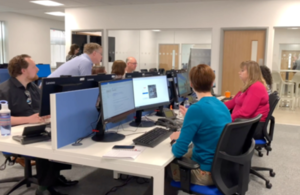New service centres see quicker support for court users
Some 30,000 court users seeking support had their calls answered in just 30 seconds, thanks to the introduction of the first Courts and Tribunals Service Centres earlier this year.

- Call waiting times reduced for Single Justice Procedure enquiries by 90%
- More than 30,000 calls answered since January 2019
- Court staff freed up to help public and legal professionals
People with cases managed under the Single Justice Procedure could previously wait up to five minutes for the phone to be answered, but are now getting the right support faster, ensuring swifter and more efficient access to justice.
The Single Justice Procedure was introduced in 2015 and allows defendants accused of non-imprisonable, victimless offences to be tried and sentenced on the papers by a single magistrate without a hearing.
This 90% reduction in call waiting times follows the introduction of Court and Tribunals Service Centres, which bring trained expertise together under one roof and use technology to solve queries more quickly. Court staff on the ground, who would previously answer calls, now have more time to better support both the public and legal professionals during hearings.
Jonathan Wood, HMCTS National Services Director, said:
It’s encouraging to see that the changes we made to the way we work are already improving the experience of the people who use our courts.
We are answering calls more quickly while providing better quality support specific to callers and their cases.
Service centres are part of a £1 billion reform programme delivered by HMCTS. As well as modernising courts and tribunals, the programme will deliver a number of service centres throughout the country to centralise services and embrace new technology to solve queries more efficiently.
Since opening the first centres in Birmingham and Stoke in January 2019, service centres have received more than 30,000 calls relating to Transport for London, television licensing, and DVLA car tax and insurance offence cases.
Callers have experienced a fall in average waiting times from more than five minutes to just 30 seconds, and just 2% of callers now hang up before their call is answered compared with 38% previously. A direct line has also been introduced for Welsh speakers, meaning their enquiry will be handled in Welsh from the very start of their call.
Service centres are now handling all enquiries about non-police SJP prosecutions, including those brought by councils, train and tram companies, the Driver and Vehicles Standards Agency, Environment Agency, and Natural Resources Wales.